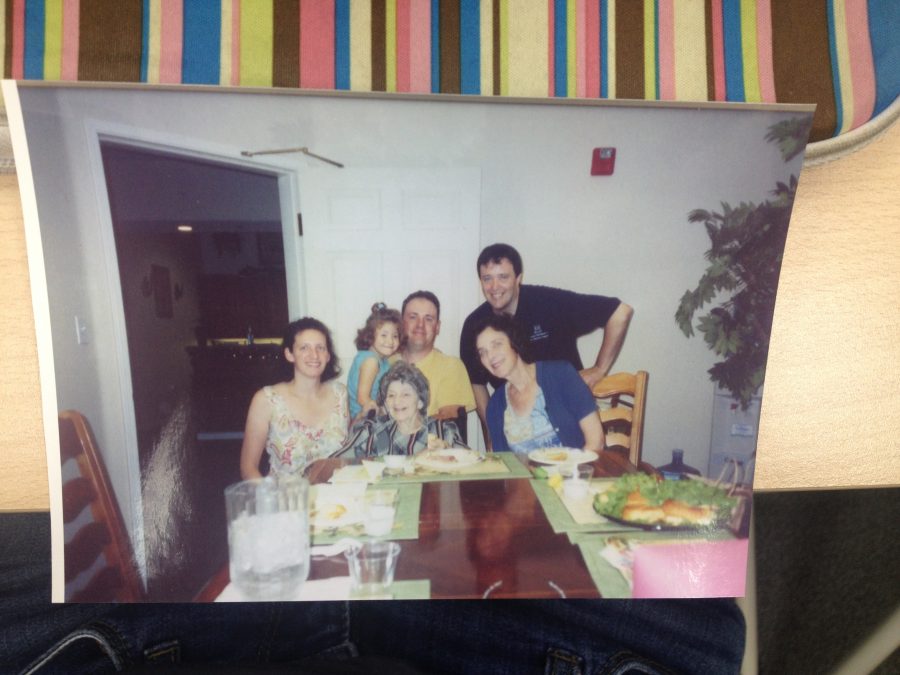When they were in their mid-20s, Margherita and Max Heitlinger, Upper School Dr. Coburn Palo’s grandparents, were smuggled out of Nazi Germany to start a new life in America.
At the rise of the Third Reich, things started escalating quickly in Germany. Jews were forced to live in certain quarters and they had to pass through certain checkpoints to get home.One evening, when Max and Margherita were walking home, a guard Margherita knew stamped her passbook at a checkpoint, looked at her meaningfully in the eye, and said “Don’t go home tonight.”
The two wandered the streets of Berlin all night long. The next day when they came back, their entire neighborhood had been emptied and taken to death camps.
“What always stuck with me was the incredible act of kindness from that one person in that moment,” says Dr. Coburn-Palo. “It really suggests that one person can do a seemingly small thing and it ripples so broadly. That circle of goodness you can create is part of why I work with students and a lot of non-profit work. I feel the profound need to give back based on the luck and courage bequeathed on us by that one person.”
With the help of Margherita’s older sister, Dr. Coburn-Palo’s grandparents were given false Danish papers and smuggled through Denmark, the Soviet Union, and imperial Japan.
When Margherita and Max finally arrived in America to begin their new life, Margherita started making stuffed animals. “She was a talented seamstress and the business became an overnight success,” says Dr. Coburn-Palo. Margherita found investors for a small factory and hired a dozen employees. She took on an American partner. But just as they were about to expand he “embezzled every penny they had and went to Brazil, leaving them penniless.” For the rest of her life, Margherita worked as a secretary. Max as a traveling salesman.
Dr. Coburn-Palo grew up with his grandparents. “My grandmother was incredibly charming. A day that she was cranky or unhappy was an incredible outlier,” he said. However, the Holocaust was a painful era for her and lessened her religious faith. “In an instant, she was forced to make an incredibly wrenching life choice,” says Dr. Coburn-Palo. “She lost a lot of friends and family in the process.”
When he was in his 20s, Dr. Coburn-Palo taught his mid-70s grandmother how to drive in the parking lot of a mall. “It didn’t go very well,” he said. “She was able to get her license but within a couple of months, she got the gas and break confused, and accelerated into a shop window. Nobody was hurt but she gave up her driver’s license after that.” He remembers teaching her as one of his fondest moments.
Dr. Coburn-Palo was also close with his grandfather. As a traveling salesman, Max went door-to-door selling 60 volume leather bound book collections called Mortimer Adler’s Great Books of the Western World. Dr. Coburn Palo’s most prized possession is a set of those books that was passed down to him.
Max and Margherita lived an incredible life together. Their romance began when Max was set up on a date with Margherita’s older sister, and Max was taken with Margherita instead. “When they saw each other, something just clicked between them,” said Dr. Coburn-Palo. “My grandpa loved reading and talking about big ideas, She was a salt of the earth person, a seamstress.” Ironically, her older sister was the one who smuggled them out of Germany. “But family trumps a situation like that,” says Dr. Coburn-Palo.
After the tragedy of World War II, “its hard to believe there’s that goodness out there.” But to Mr. Coburn-Palo, the story of his family shows that “an act of the individual person can be that beacon of goodness.”
In the midst of war, one small act of kindness
November 4, 2014
0
More to Discover


![Sofia Valadao [Erin Wu/The Blue&Gold]
Erin Wu [Annabelle Hsu/The Blue&Gold]](https://blueandgoldonline.org/wp-content/uploads/2025/05/erin-sofia-pic.png)
![Dr. Simeondis, Mr. Anderson. [Annabelle Hsu/The Blue&Gold]](https://blueandgoldonline.org/wp-content/uploads/2025/05/teachers-1200x675.jpg)
![[PHOTO COURTESY OF UNCULTURED, JUNIPER AND CO.]](https://blueandgoldonline.org/wp-content/uploads/2025/05/student-businesses-1200x675.png)
![Photo of the girl's varsity badminton team [PHOTO COURTESY OF TAS ATHLETICS]](https://blueandgoldonline.org/wp-content/uploads/2025/05/BadmintonTeam-04839-1200x675.jpg)
![The Institute for Speech and Debate, now based all across the east coast of the US. [PHOTO COURTESY OF MR. WILLIAMS]
Mr. Morris' various ceramic artwork. [PHOTO COURTESY OF MR. MORRIS]](https://blueandgoldonline.org/wp-content/uploads/2025/05/Untitled-design-1-1200x918.png)
![Mr. Castro celebrates at the finish line. [PHOTO COURTESY OF MR. CASTRO]](https://blueandgoldonline.org/wp-content/uploads/2025/04/20240513_092650124_iOS-e1745300337344-1200x1116.jpeg)